Payment Terms & Conditions
If your business accepts payments from users through your website and/or mobile app, you should include specific clauses in your Terms and Conditions agreement that discuss the payment terms.
This is useful to all businesses, whether your business:
- Is a SaaS app that collects payments monthly/yearly (such as an online subscription service that users pay per year for)
- Is a business that collects payments for products/services on a one-time, per-order basis (such as any basic e-commerce store that sells goods/services or just digital products).
Payment terms in your Terms and Conditions agreement can help to protect your business as well as keep your customers informed of your expectations when it comes to payments.
Common information included in these type of clauses are:
- How customers are able to pay (what payment methods are accepted, i.e. credit cards, purchase orders)
- How late or missed payments will be handled
- Return and refund information
- How payment disputes will be handled
Payment Terms for SaaS Apps
If you have a SaaS app that allow customers to purchase subscription plans or pay a regular fee at regular intervals (such as a monthly recurring bill), you'll want to consider addressing the following in your SaaS Terms and Conditions agreement:
- Reserving your right to suspend a customer's service or cancel the customer's account, and what will trigger you to do so
- How renewals will be done (for example, automatically unless canceled, or only with active steps taken for account renewal)
- How often a customer will be billed for the service
- If any refunds are provided for canceled subscriptions/contracts or other circumstances
- Reserving your right to change prices of your service at any time
Here are a few examples of payment terms clauses found in legal agreements of different apps.
SalesForce
SalesForce includes its payment terms within its Master Subscription Agreement (MSA). This MSA is the binding agreement between subscribers to the services of SalesForce, and SalesForce.
Its "Table of Contents" shows a breakdown of each section, with a section relating specifically to "Fees and Payment for Purchased Services":
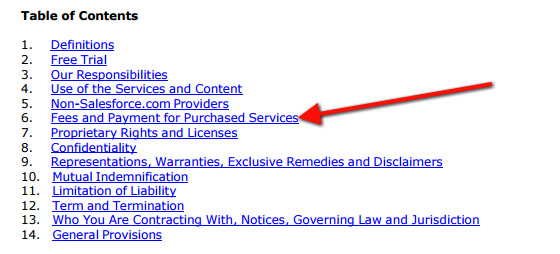
The "Fees & Payment" section includes a number of sub-sections where different clauses are included.
The "Fees" section lets users know that fees are based on subscriptions purchased and not calculated by actual usage.
A Refund Policy is discussed in Salesforce's agreement, and users are informed that they cannot decrease their quantity purchased during the relevant subscription terms.
This is important information for users to have, and for SalesForce to insert in the agreement. Otherwise, users may request refunds for not using the subscription service for a portion of the month, or wish to downgrade their subscription plan halfway through their term, both actions which SalesForce doesn't want to allow.
Including this kind of terms allows SalesForce to make the rules for their business, and also lets users know what they're signing up for before they choose to subscribe.

Other important clauses included by SalesForce in its MSA agreement include information about "Invoicing and Payment", where customers are informed of what payment methods are accepted, and how invoicing will work.
An "Overdue Charges" section tells customers what the penalty will be for when payments are not made timely:
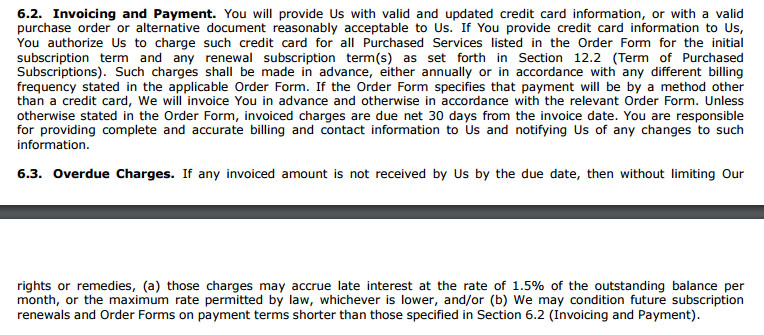
The agreement also includes a clause that reserves its right to suspend overdue accounts.
This can be incredibly important for a SaaS app so that its rights to take action against non-paying customers are maintained and reserved, as well as made known to the customers.

SalesForce also includes a clause that outlines how payment disputes will be handled.
This can also be another important clause in any sections of a legal agreement related to payment terms and rules because it allows a business to limit how disputes will be handled, such as through arbitration only, and provides customers with a method for raising disputes in a way that's most convenient for all parties.

Kissmetrics
Kissmetrics Terms of Use includes a section titled "Fees" to discuss payments.
This section includes a number of sub-sections and beings with the "Subscription Terms" clause. This clause is actually somewhat of a broad summary of Kissmetrics' available subscription terms and how billing can be selected either annually or in fewer increments (monthly, etc.).
Automatic renewal information is included, along with a contact email address and instructions on how to access your account. This section is very useful for customers who want to quickly get information on how a subscription to Kissmetrics works:
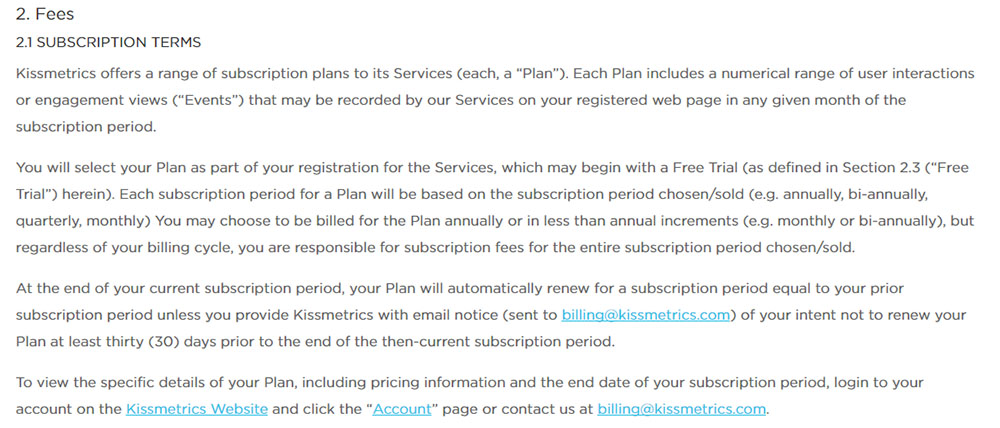
Additional sections in the agreement go into more detail about each aspect of an account, including billing, refunds, acceptable forms of payment, how to change your subscription, and how to cancel your account.
Kissmetrics reserves the right to change fees for its service at any time. This is added as a clause in their agreement.
You can also add this kind of terms in your agreement in the event that you want to raise prices if an unforeseeable circumstance arises that causes your app to become far more costly to provide.
"may change the fees for the Services at any time or impose additional fees or charges"
Here's how the "Changes in fees" clause looks in Kissmetrics' agreement:

In its agreement, Kissmetrics also reserves the right to deactivate a customer's access to app if there is failure to pay:

In its "Account cancellation" clause, Kissmetrics' customers are informed that they may cancel their accounts, with 30 days notice, but that they'll still be responsible for payment up until the conclusion of that current subscription period:

Crazy Egg
Crazy Egg Terms of Use includes a "Fees" section where all of the relevant payment terms clauses can be found.
Similarly to Kissmetrics, Crazy Egg includes an introductory section where subscription terms are broadly outlined for customers, including how pricing is based on usage.
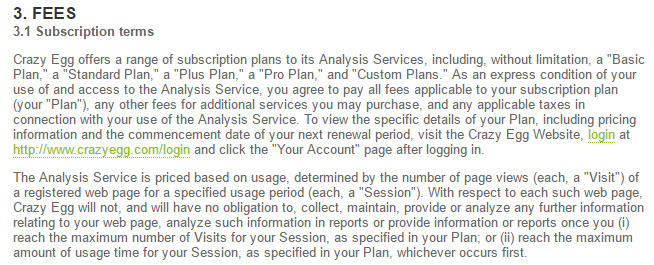
Crazy Egg uses numbered lists in some of its "Fees" section to help break down information for customers.
The "Payment Terms", "Refunds", and "Upgrade and Downgrade Terms" section uses numbers and very clear, basic language to outline information that customers would need and want to know.
For example, the first clause of the "Payment terms" section informs customers that fees are billed in advance, are non-refundable and are automatically renewed.

Its "Account Cancellation" section also uses numbered lists to clarify the payment terms, including information that the only valid method for canceling an account is via a link on a specific webpage, and how canceling an account will affect payment obligations and access to data.

A lot of SaaS apps offer free trial periods to users.
Oftentimes, users must enter credit card or other billing information before the trial period can begin, and will be automatically set up to be billed at the end of the free trial period if the user doesn't cancel the account beforehand.
Crazy Egg handles this by including a section that covers the "Free Trial Period" information.
Bold font is used to draw extra attention to the clause that lets users know that if their free trial service isn't canceled before it ends, authorization to charge the user's credit card will be assumed and that Crazy Egg will not send out a notification regarding the ending of the free trial period.
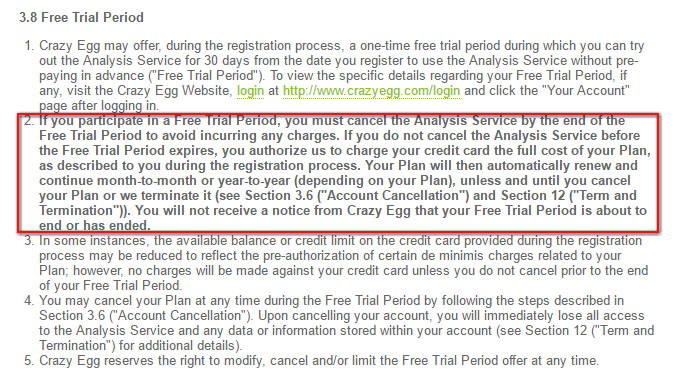
This use of bold font and numbered sections is a great way to draw attention to specific important clauses related to payments and to break them down for customers in a very readable way.
Dropbox
Dropbox includes a section within its Terms of Service titled "Paid Accounts" for its payment terms.
This super short, to-the-point section has four sub-sections: "Billing", "No Refunds", "Downgrades", and "Changes".
Every basic aspect of a paid Dropbox account is outlined here, including automatic billing information, a no refunds policy, a reserved right for Dropbox to cancel or downgrade service when a customer doesn't pay, and a reserved right for Dropbox to change fees.

Slack
Another very reader-friendly method for supplementing payment terms sections for your SaaS is by providing a FAQ.
Slack has created a Billing FAQ where questions regarding payments, payment methods, non-payment, and refunds are answered.
While information on payments from customers is included within the Terms of Service of Slack, the Billing FAQ really helps clarify common questions from customers, such as how to update credit card information, how invoicing works, and how refunds work.
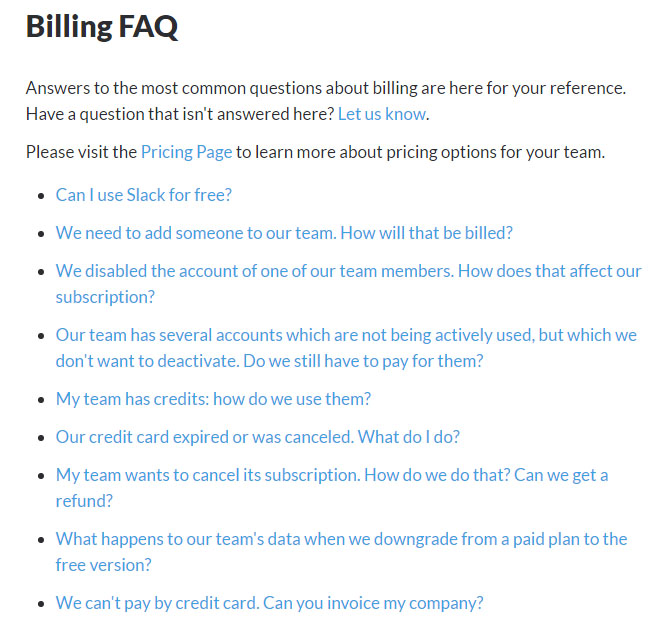
Payment terms for one-time payments
Regular, non-SaaS businesses or mobile apps allow customers to make purchases on a one-time basis. This could be anything from purchasing a pair of shoes, making a hotel reservation, or purchasing a mobile app.
By nature of the difference in business types of a SaaS business versus a non-SaaS business, the clauses for payment terms found in the legal agreements for these one-time purchases businesses differ.
Similarly to SaaS, you may want to include clauses that discuss the following:
- What payment methods you accept
- How customers must pay you, and when
- If you offer refunds or allow returns
- What exactly a customer is purchasing when purchasing through your website or app
- Any rights you wish to reserve, such as limiting your liability
Here are a few examples of how one-time payment businesses structure their payment terms clauses, and what information is included.
Apple
Apple includes one main Terms and Conditions agreement that covers a number of its services, including the iTunes Store, Mac App Store, App Store for Apple TV, etc.
The "Terms of Sale" section applies to "all products you purchase through the Services."
Apple informs customers that "all sales and rentals of products are final" and that purchases made through any service will be completed by charging whatever payment method is on file for the customer:
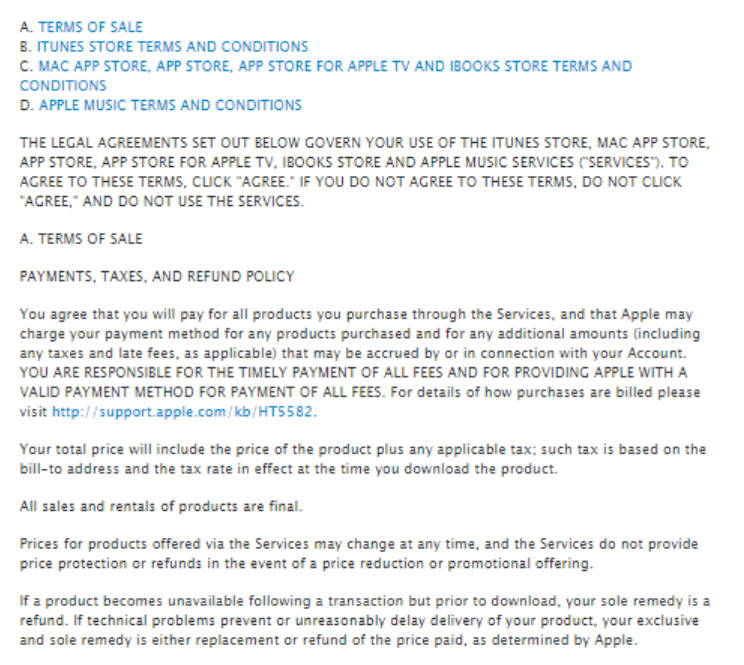
This simple, overarching payment terms clause works well for a company like Apple that has a number of ways for customers to purchase electronic media such as songs, movies, and mobile apps.
Envato Market
The Envato Market terms agreement includes a section titled "How Buying Items Works". This extensive section thoroughly explains all aspects of how purchases can be made through Envato.
Envato sells licenses to use items rather than actual items. This concept is described and explained to customers:

Envato also breaks down what fees and charges go into each total price so that customers can more easily understand what they're being charged, and links to areas of its Market Terms that go into further detail about the fees.
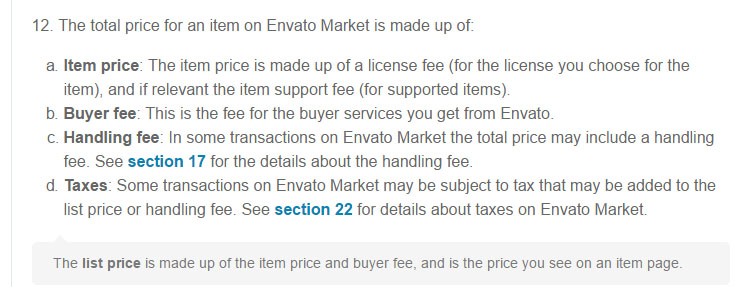
The "Transacting as a Buyer" section breaks down how people can purchase on Envato: either with a "Buy Now" feature or by purchasing Envato credits.
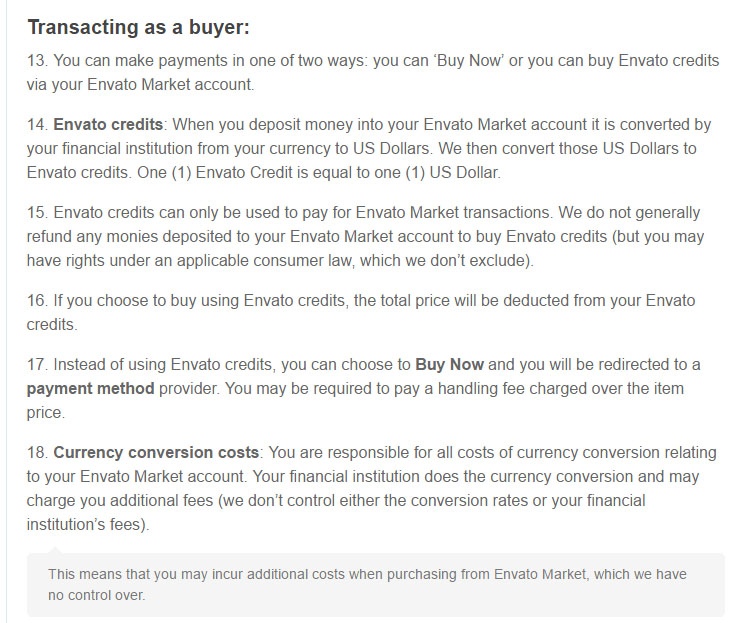
Because Envato credits have some limitations (credits expire if not used within a year after being purchased), a section that outlines this information and exceptions are appropriately included.
This is important information for customers to know before choosing to purchase Envato credits.
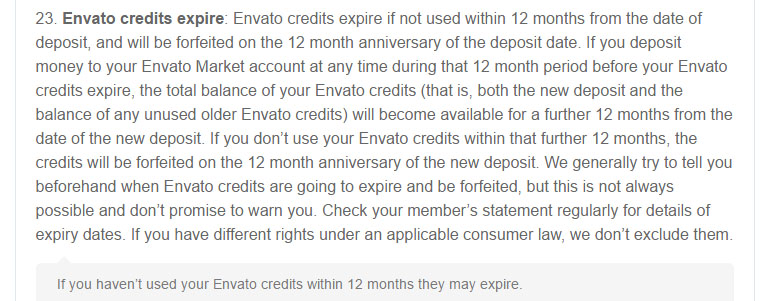
The "Terms of Buying" section lets customers know what they're agreeing to do when they make a purchase on Envato.
Some of these terms on buying include a reminder that the customer is purchasing a license and a reservation of the right to enforce terms of that license against the customer if need be.
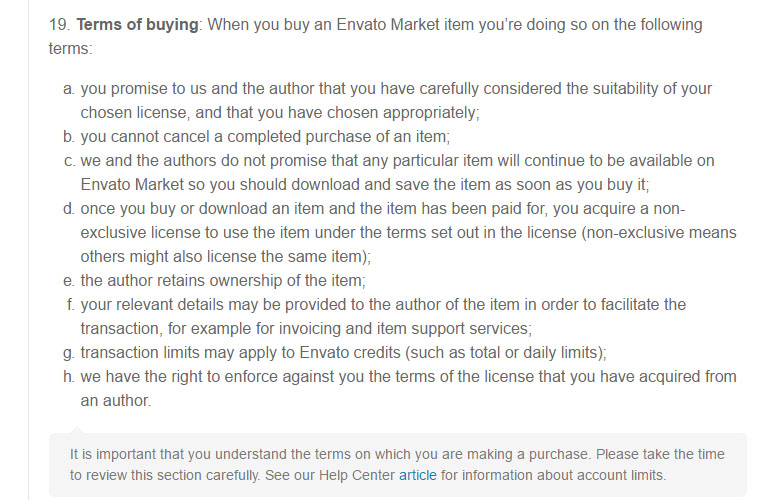
Conditions and situations under which a refund may be granted, as well as how to request one, is covered in the "Refunds" section.
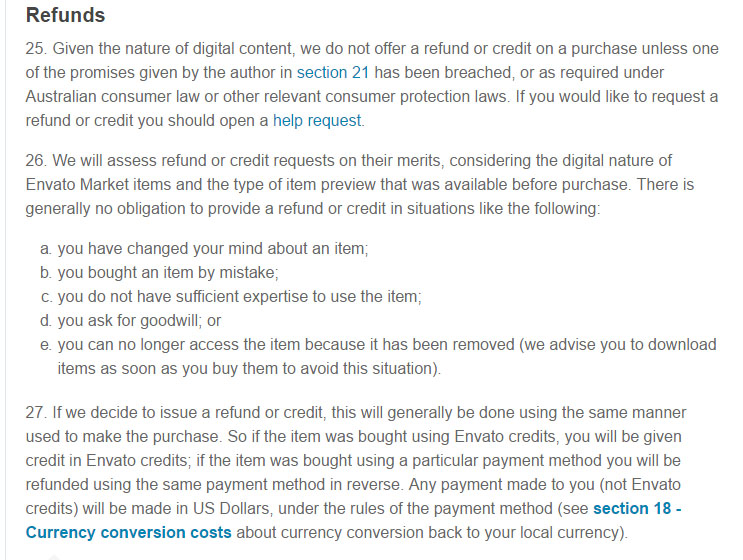
Teleadapt
Teleadapt has a fully separate "Sales Terms & Conditions", complete with definitions of key terms used, limitations of liabilities, and other thorough information regarding sales and purchases.
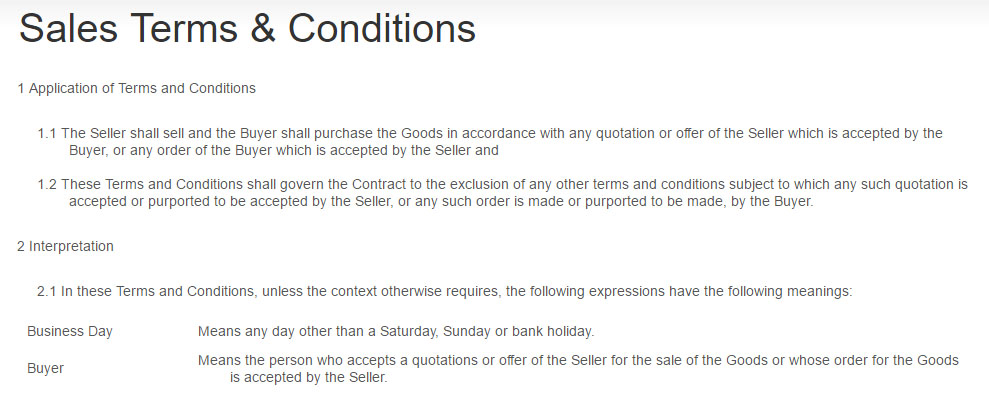
Sections in its "Sales Terms & Conditions" include "Price", "Payment", "Delivery", "Buyer's Default", and others with clauses regarding payments that work to describe the expectations and obligations of both the buyers and sellers.
For example, the "Payment" section includes clauses informing customers that credit card orders over the amount of USD $1,600 will incur a 4% charge that the buyer will be responsible for paying, and other payment terms that are important for buyers to know before making a purchase through Teleadapt.
While the required clauses for payment terms found in the Terms and Conditions of a SaaS app versus the Terms and Conditions of a one-time purchase type of business differ, both should aim to describe to customers the following information:
- What customers are able to purchase,
- How customers are able to make purchases (acceptable payment methods, required account registration, etc.),
- If refunds/returns (or account/service cancellations) are possible,
- What happens if a customer is supposed to pay for something and doesn't,
- Any other information that customers would need or want to know in order to be fully clear on your payment terms.